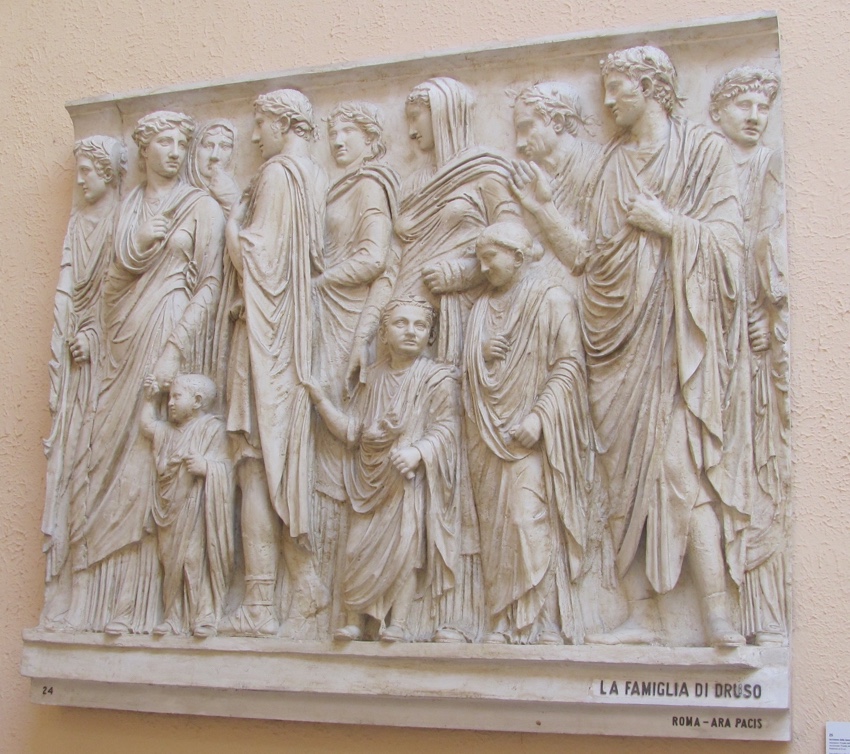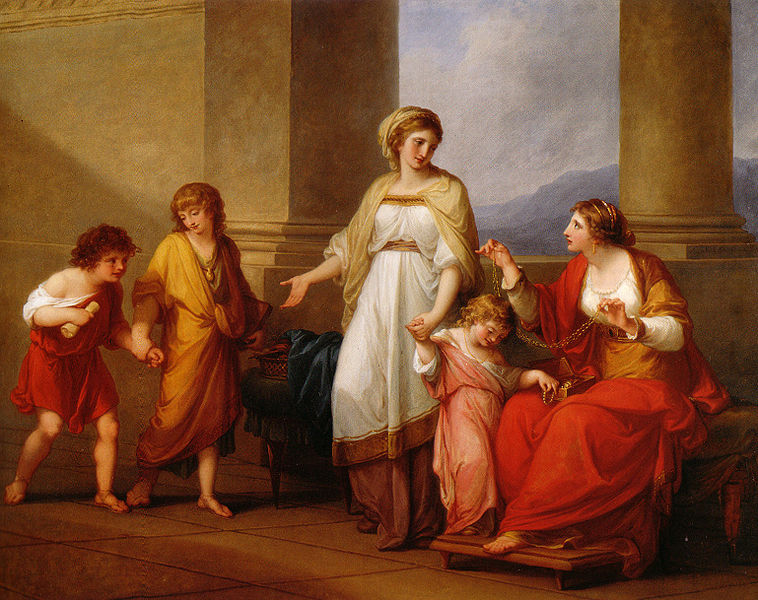I’ve been fascinated by all things Roman since I walked on my first mosaic in northern Spain. At age eleven, I wanted to know who the people were who had lived in houses with such beautiful floors: what did they eat, what did they work at, what were the children and parents like? As I grew older and studied the Romans more formally, I appreciated what a complex, clever and determined society they had made. “Rome” in the West lasted for 1229 years – that’s the equivalent of from AD 789 to today.
Rome passed from mud hut tribal subsistence farming to the heights of the Pax Romana with its rule of law, art and literature, trade, engineering, and ability to learn; Romans set the template for the western nations that emerged over the next centuries.
I don’t want to sound too much like the John Cleese in the Monty Python video “What have the Romans done for us“, but you get the idea I’m impressed! However, we do well to remember not everybody lived well, especially at the lower end of the social spectrum as a slave, but the vast majority of the population had a standard of living that wasn’t achieved again until the nineteenth century.
In my thriller novels, Roma Nova is governed by women. The Ancient (“real”) Romans had a very interesting way of viewing women: they were granted the status and respect, but had no public rights or say in their world. In law, women were viewed more or less as disposable property belonging to the family. How then do I reconcile the view of the “real” Romans with the Romans in my alternative timeline?
If they were free-born, women in ancient Rome were citizens – an important status in a world where a hefty proportion of the population was slave. Towards the later Imperial period women gained much more freedom to act, trade, own property and run businesses of all types. But they still held no direct political power. Producing the next generation, running complex households and contributing to social, religious and cultural life were not activities as valued as in the twenty-first century (and that’s a contentious point!)
Nevertheless, women from wealthy or powerful Roman families could and did exert influence throughout Rome’s history: Cornelia Africana, mother of the Gracchi; the Julio-Claudian Livia Drusilla, wife and councillor of Augustus; the later Severan Julias; and Galla Placidia towards the end of the Roman Empire.
In my novels, women rule, but men are not disadvantaged; life is much more nuanced than that. Roma Nova survived by changing its social structure; as men constantly fought to defend the new colony, women took over the social, political and economic roles, weaving new power and influence networks based on family structures.
So far, only a few steps away from the traditional Roman cultural pattern…
But given the unstable, dangerous times in Roma Nova’s first few hundred years, especially during the Great Migrations in Europe, Roma Nova ran out of young and older men to put in the front line. Fit and tough as pioneers tend to be, daughters and sisters put on armour and hefted weapons to defend their homeland and their way of life. Fighting danger side by side with brothers and fathers reinforced women’s roles. And they never allowed the incursion of monotheistic paternalistic religions. So I don’t think that it’s too far a stretch for women to have developed leadership roles in all parts of Roma Novan life over the next sixteen centuries.
My female protagonist Karen’s story starts in INCEPTIO in a standard Western society. When she is compelled to flee to her dead mother’s homeland in Europe, she finds the Roman-infused culture unnerving; Roma Novans live to a tough ethic of self-sufficiency, and an ingrained sense of duty to their state – core Roman values which have been crucial to their survival down the centuries. The strong female characters surrounding Karen – her grandmother, cousin, female colleagues and friends – are the result of this and form the pattern for her.
And the biggest challenge when writing about strong women? Plausibility.
You can’t jump from a passive, protected fragile flower to super-heroine, even if she passes through a formative traumatic event. Writers need to give hints about resilience, integrity and an ability to develop confidence as well as physical abilities. Undoubtedly, a strong female character has to have an equally strong will and a passion to drive through what she believes in.
Although Karen starts in INCEPTIO as an office worker, we see from the first page that she’s prepare to stand her ground against people doing wrong, even knocking them to the ground when they’ve attacked her. We know she’s outdoorsy and sporty, has learned to protect herself emotionally and to question everything. She demonstrates signs of mental and physical toughness and resilience even when living in a ‘normal’ existence. So when she becomes an undercover operative, she already has many latent characteristics required. She’s not without doubts, though – she’s no Lara Croft!
A second, related challenge is not falling into the trap of making a strong character have moments of unbelievable weakness. Doubt, a temper, love for movies, a penchant for butter beans or brandy help to round a character out, but writers must not go too far and over-compensate for the toughness. A military type will drink and swear – it’s the pressure of the job – but she will have the normal emotions of any other woman, although expressed differently. While Aurelia’s political and military skills are well developed, she’s very aware of her lack of easy social chit-chat. She’s unable to connect with her daughter and her cousin Severina when they talk and laugh about films and fashion. But she does love her roses, and of course, the restless Miklós…
Alison Morton is the author of Roma Nova thrillers – INCEPTIO, PERFIDITAS, SUCCESSIO, AURELIA, INSURRECTIO and RETALIO. CARINA, a novella, and ROMA NOVA EXTRA, a collection of short stories, are now available. Audiobooks are available for four of the series.
Download INCEPTIO, the series starter, FREE as a thank you gift when you sign up to Alison’s monthly email newsletter. You’ll also be first to know about Roma Nova news and book progress before everybody else, and take part in giveaways.
















I find the books fascinating. I always wonder what would have happened if the “British” Emperors in 383AD & 407AD had kept their troops in Britain. We know Britain at the time was a prosperous province, could there have been a “Northern”Roma Nova surviving into modern times,and how would “Britannia” have interacted with Roma Nova down the centuries?
Interesting premise, Phil!
I’ve made the UK more powerful in the Roma Novan timeline world that it is in ours, but I haven’t thought try trying the alternative timeline with Britain itself. Roma Nova was isolated and retained links to the Eastern Empire which I think helped it survive. Although comfortable, It wasn’t especially prosperous until the modern era.
Post-Roman Britain was very vulnerable from not only the indigenous tribes piling in as soon as Roman protection had been withdrawn from Britain, but also from Saxons, Angles, Jutes, Vikings, etc. invading, so I’m not sure it could have held out.
I think after some 300 years plus of Roman occupation it’s possibly wrong to think of the indigenous tribes as suddenly rising up now the “Romans” had left? For everywhere south of the Wall (and a bit beyond) I suspect people identified as being part of Rome, according to what history we have they certainly went to great lengths to try and keep it running. But without a Central Army (and Imperial Government) able to enforce taxation and provide a central strategy, various regions started doing their own thing, and stopped contributing to the centre because they couldn’t see the point of it at their level. It’s true the coast lines were vulnerable, but far less vulnerable than the Rhine frontier? It’s also a fact that with a strong central Army “Germanic Immigration” would have been a much more managed process and the rise of regional warlords would have been curtailed. In the East I think Anastasius I showed what could be done by reforming administration and taxation, thus actually lowering taxes whilst paying indigenous soldiers more and reducing the reliance on the Foederati? Of course – it didn’t happen – but it’s nice to think it could have.